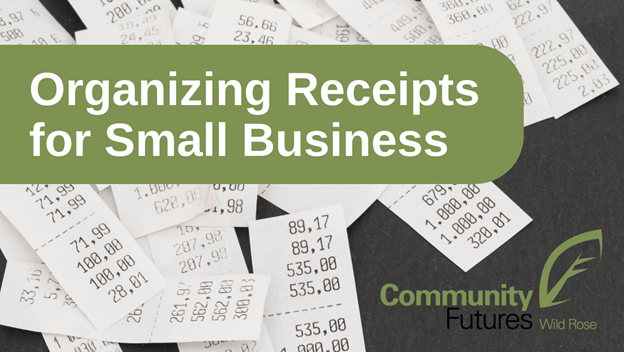Efficient record keeping and receipt organization is a crucial part of financial management in small business. It ensures you have a clear picture of your expenses, simplifies tax filing, and helps you stay on top of your budget. That said, most small business owners find this aspect of running a small business to be their least favourite! The task of keeping track of receipts and financial information can be daunting. Where does one even start? In this blog post, we'll provide some simple guidance to get you started.
1. Keep Personal and Business Separate
The very first step in getting organized is to separate your personal and business expenses. Having a separate bank account and keeping a separate credit card specifically for business expenses will make record-keeping so much easier. Plus, it keeps your personal bank account open should you ever be audited. Even a very small home-based business or sole proprietor should have a separate business account.
2. Keep Your Receipts
As a small business owner, it's important to keep your receipts. In the event of an audit, the CRA will want both proof of purchase and proof of payment. This means you need both the receipt and the bank or credit card statement. For tax purposes, you’ll need to keep those receipts for 7 years. Some examples of types of receipts to keep:
Income Receipts: These include invoices and sales receipts that show the money coming into your business. Keep these to track your revenue and for tax purposes.
Expense Receipts: Any purchase made for your business. Some examples are office supplies, equipment, or services like marketing or consulting. These should each be backed by a receipt.
Travel Receipts: If your business involves travel, keep receipts for expenses like airfare, hotels, meals, and transportation as these are often tax-deductible.
Meal and Entertainment Receipts: Receipts for business-related meals or client entertainment can also be tax-deductible, so it's crucial to keep them.
Utility Receipts: Utility bills for your business premises, such as electricity, water, and internet, should be filed as they are business expenses.
Asset Receipts: Receipts for significant business purchases, like laptops, machinery, or vehicles, are essential for tracking depreciation and potential tax deductions.
Loan and Interest Receipts: Keep receipts for loan payments and any interest paid on loans as these can impact your business's financial statements.
3. Organize Your Receipts
Organizing receipts for your small business is crucial for efficient financial management. We suggest storing your physical receipts in an accordion folder. This way, they can be divided into categories based on your spending types. If you find them effective, you could simply use the categories we listed in the section above.
To enhance the utility of your paper receipts, add notes to the back of each one. For instance, if you meet a client at a coffee shop, jot down who you met with and the purpose of the meeting on the back of the receipt immediately after your meeting concludes. This ensures you won't struggle to recall important details later on.
Additionally, for added security and accessibility, consider taking pictures of your receipts to create digital backups. Even better, use a receipt scanner app to streamline the process and maintain a well-organized record of your business expenses. Digitally backing up all your receipts is important and most professional accountants prefer it.
4. Digital Organizing
Many businesses are going completely paperless, but you can still keep your paper receipts if you like. Still, nowadays, many of our receipts are digital. If you are dealing with predominantly digital receipts, you will want to find an effective way to organize them digitally instead of printing each receipt out and filing it physically.
There are apps available to small business owners where you can import all your receipts and other financial documents to organize and export. Check out these digital ways to back up and organize receipts as recommended by local accountants:
This is a great way to organize PDF bills, email receipts, photos of physical receipts, and the like. However don’t forget, technology can be fickle so you will always want to have a backup of your digital files separate from your computer. Some people will do this with the cloud or with an external hard drive. Digitalizing all your receipts and keeping them in an organized folder will make it easier should you employ an accountant or tax professional.
5. Consult a Professional
Each business is unique so it can be very beneficial to speak to a professional to ensure you're following the best practices for your specific business needs. Consider consulting with an accountant or tax professional right from day one. They can provide personalized advice on organizing receipts based on your business needs and local tax regulations.
In conclusion, organizing and retaining receipts is a critical aspect of small business accounting. Having organized and comprehensive receipts can help provide a clear picture of your finances. This is valuable for tracking your spending patterns, identifying areas where you can cut costs, and making informed financial decisions. And, of course, serves as proof of your business expenses for tax purposes. By following the simple guidelines listed above, you are taking your first steps toward ensuring that your financial records are accurate, accessible, and ready for tax season.
---------------------------
Community Futures Wild Rose is a non-profit organization dedicated to building an economically diverse future in our region. We offer many services and free resources to small businesses. You can even schedule a one-on-one meeting with our analyst. Contact us by e-mail at
We’re here to help.




